What Is Teeth Whitening?
Teeth whitening is an extremely efficient method of lightening the natural tooth color without any surface removal. This won’t lead to a complete change in color, but it lightens the shade. There are multiple reasons why you might want to whiten your teeth. Just the way hair and skin color vary from person to person, so do our teeth. There are very few people we have come across who have brilliantly white and toned teeth. Your teeth staining can also be caused by food and drinks such as tea, coffee, red wine, and blackcurrant. Smoking is also one of the significant reasons behind tooth staining. Some individuals have under the surface staining, which can be caused by certain antibiotics or maybe a result of tiny cracks in the teeth.
Reasons Behind The Change In Tooth Color
Along with passing years and growing age, your teeth color can change from clean white to not-so-white.
Following are the reasons simplified :
FOOD & DRINK: drinks like coffee, tea & red wine have strong pigments called chromogens that get stuck on the natural color of your teeth and can lead to stains.
TOBACCO USE: chemicals found in tobacco result in stubborn stains. These chemicals are tar and nicotine.
AGE: the outer shell of your enamel is called Dentin. This is a softer area, and over time gets thinner due to brushing.
TRAUMA: if you’ve been hurt on your tooth, it will certainly change color as it responds to any injury placing more and more Dentin, which is a darker layer.
MEDICATIONS: the darkening of your teeth can be an outcome of certain antihistamines, antipsychotics, or medications related to high blood pressure. Young children exposed to antibiotics may have tooth discoloration. Treatments like chemotherapy and head & neck radiation can also lead to dark teeth.
How Does Teeth Whitening Work?
Tooth whitening is a simple process, and the whitening products contain one of the two bleaches, namely, hydrogen peroxide & carbamide peroxide. These bleach perform the task of breaking down stains into smaller pieces, which would eventually result in less concentration of color, and make the teeth look brighter.
It is essential to talk to your dentist before deciding to whiten your teeth; this is so because whiteners may not correct all types of teeth. For instance, people who have yellow teeth can go for it, on the other hand, brown teeth may not respond well to it, and teeth with grey tones may not bleach at all. Further whitening does not act on caps, veneers, crowns, or fillings. There are a few more exceptions like discoloration caused due to medication and injury.
How Long Does This Take?
The entire procedure of teeth whitening treatment can last up to three to four weeks. Firstly you will need two or three visits, and then the dental team will take the impression and prepare a mouthguard for you. Once the dental team starts performing, you need to take measures back at home for effective results, which refers to applying the whitening product that has been prescribed, regularly over two to four weeks for around 30 min- 1hr in a go. Not only this, there are few more products which can be used for up to 8hrs, resulting in a satisfactory outcome in just a week.
What Options Do We Have?
It is always prescribed to talk to your dentist before starting any treatments. However, if you are a candidate, you have four ways to bring back that sparkling smile:
Stain removal toothpaste- These help in the removal of stain through mild action of abrasives that scrub the teeth.
The in-office bleaching-This process requires only a single visit to the dentist & is also known as chairside bleaching.
- At-home bleaching from the dentist- In this process, you are going to be provided with a customized tray by your dentist for home & all you need to do is follow the instructions given by your dentist on how to place your bleaching solution. This process may take a while.
- Over-the-counter bleaching products- These include different products available online or in grocery shops, such as toothpaste or strips that whiten your teeth.
Does Tooth Whitening Inflict Any Side Effect?
People may realize that their teeth have become sensitive or sore to cold during or after the treatment or whitening. There may be chances of discomfort in gums, sore throat, or further lead to white patches on the gum line. These symptoms usually disappear within a few days of treatment.
If there are any cases of side effects continuing, one should positively see his/her dentist at the latest.

